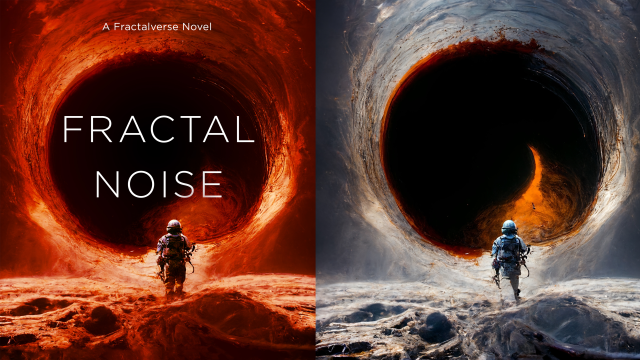A few weeks ago, right here on Gizmodo, readers got their first look at the cover for Christopher Paolini’s newest Fractalverse novel, Fractal Noise. Almost immediately, people could see something was off about the artwork used on the cover.
With some quick deduction, Twitter users realised that it was AI-generated art, which was originally posted to a stock art site by a user named Ufuk Kaya. It was also arranged by the in-house designer, who is not credited — something unusual for Tor, as the publisher often promotes the art directors and designers of each cover.
After receiving widespread backlash online, Tor posted the following message on its Twitter, which explains that it licensed an image from a “reputable stock house.” While this is totally normal, what’s not normal is that Tor, a massive publishing company, would not have realised that this was AI-generated. Tor is well-known for its extremely good covers; through its many imprints, especially TorDotCom and Nightfire, it has often used incredible illustrators to create covers. This apology is weak, and what’s more, it’s frustratingly devoid of any change or explicit promises not to use AI-generated images in the future.
— Tor Books (@torbooks) December 15, 2022
Tor saying it’s going to move ahead with the cover is painfully tone deaf. Follow that up with the end of this post, which notes that Tor “has championed creators in the SFF community,” and it really feels like the publisher is rubbing salt in the wound here. Paolini is a massive name with a huge following — this isn’t a debut or even a mid-list author’s work. If anyone can afford a production delay it’s probably someone like Paolini, even if the book release was delayed a year (a possibility, according to in his tweet responding to the announcement). As it stands, the book isn’t even releasing until May of 2023.
To base covers almost entirely on AI-generated images devalues the hard work of everyone involved — from the authors and artists to the designers, editors, and everyone else at the publishing house. It’s a poor showing from one of the leading SFF publishers in the industry. AI art generators scrape images from artists and generate an amalgamation of the most average possible image from a prompt. It’s disingenuous to call this technology anything but art theft, and even more upsetting that Tor would claim to champion creators while still undermining the actual artists whose work was taken by an algorithm to produce this cover. Gizmodo has reached out to Tor for additional comment, and will update this post if we hear back.
Want more Gizmodo news? Check out when to expect the latest Marvel, Star Wars, and Star Trek releases, what’s next for the DC Universe on film and TV, and everything you need to know about James Cameron’s Avatar: The Way of Water.
